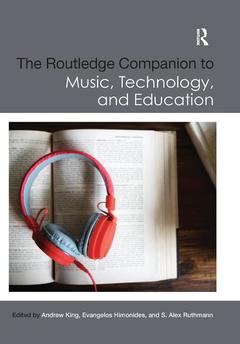The Routledge Companion to Music, Technology, and Education Routledge Music Companions Series

The Routledge Companion to Music, Technology, and Education is a comprehensive resource that draws together burgeoning research on the use of technology in music education around the world. Rather than following a procedural how-to approach, this companion considers technology, musicianship, and pedagogy from a philosophical, theoretical, and empirically-driven perspective, offering an essential overview of current scholarship while providing support for future research. The 37 chapters in this volume consider the major aspects of the use of technology in music education:
- Part I. Contexts. Examines the historical and philosophical contexts of technology in music. This section addresses themes such as special education, cognition, experimentation, audience engagement, gender, and information and communication technologies.
- Part II. Real Worlds. Discusses real world scenarios that relate to music, technology, and education. Topics such as computers, composition, performance, and the curriculum are covered here.
- Part III. Virtual Worlds. Explores the virtual world of learning through our understanding of media, video games, and online collaboration.
- Part IV. Developing and Supporting Musicianship. Highlights the framework for providing support and development for teachers, using technology to understand and develop musical understanding.
The Routledge Companion to Music, Technology, and Education will appeal to undergraduate and post-graduate students, music educators, teacher training specialists, and music education researchers. It serves as an ideal introduction to the issues surrounding technology in music education.
Part I: Contexts
1. Digital Aletheia: Technology, Culture and the Arts in Education (Andrew Burn)
2. Instrument Technology: Bones, Tones, Phones, and Beyond (Tae Hong Park)
3. Cognition and Technology for Instrumental Music Learning (Marc Leman and Luc Nijs)
4. Learning from Live Coding (Pamela Burnard, Franziska Florack, Alan F. Blackwell, Samuel Aaron and Carrie Anne Philbin)
5. The Sounds of Music (Leigh Landy)
6. For What It's Worth (Teresa Dillon)
7. Gendered Perspectives (Victoria Armstrong)
8. Technology, SEN and EY (Evangelos Himonides, Adam Ockelford and Angela Voyajolu)
9. ICT in Music Education (William I. Bauer and Hiromichi Mito)
Part II: Real Worlds
10. Game Technology in the Music Classroom (Andrew Brown)
11. Audio and Education (Kyle P. Snyder)
12. Music Production: Education and Industry (Andrew King)
13. The Painting of Sound (Jonathan Savage)
14. Improvisation (Matthew Sansom)
15. The Laptop Orchestra (Ge Wang)
16. Popular Music and Technology in the Secondary School (Bradley Merrick)
17. Young Children's Potentialities as Music-Makers (Vicky Charisi)
18. Young Offenders (Jennie Henley)
19. Multimodal Environments for Learning (Serena Zanolla, Antonio Camurri, Corrado Canepa, Paolo Coletta, and Gualtiero Volpe)
Part III: Virtual Worlds
20. Media (Jordan Mroziak)
21. Social Networks as Agency in Music Learning (Janice Waldron)
22. Musical Making (Eric Rosenbaum)
23. Video Games (Evan S. Tobias and Jared O’Leary)
24. Transnational Collaboration (Andrea Giráldez and David Carabias)
25. Virtual Choirs (David Howard)
26. Researching Virtual Music Worlds (Kari Veblen and Nathan B. Kruse)
Part IV: Developing and Supporting Musicianship
Andrew King is Head of Music at the University of Hull, UK, where he has held numerous senior leadership roles such as Deputy Dean (Learning & Teaching) and Associate Principal. He is Editor of the Journal of Music, Technology and Education.
Evangelos Himonides is Reader in Technology, Education and Music at University College London, where he currently leads the post-graduate program in Music Education. Evangelos is a Chartered Fellow of the British Computer Society.
S. Alex Ruthmann is Associate Professor of Music Education and Music Technology in the Steinhardt school at New York University. He also served as President of the Association for Technology in Music Instruction, is currently Associate Editor of the Journal of Music, Technology and Education, and has served as Chair of the Creativity special research interest group of the Society for Research in Music Education.
Date de parution : 12-2019
17.8x25.4 cm
Date de parution : 12-2016
17.8x25.4 cm
Thèmes de The Routledge Companion to Music, Technology, and Education :
Mots-clés :
Playback; Music Technology; Routledge; TPACK; companion; Laptop Orchestra; Face To Face; Andrew King; MIDI; Evangelos Himonides; Group Piano; Alex Ruthmann; Midi Accompaniment; Music; MIDI Data; Education; Music Programmes; Music Education; Midi File; Primary education; Musical Engagement; Secondary education; Professional Development; Musician; Music Classroom; Music research; Music Teachers; Real worlds; TPACK Model; Virtual worlds; Clips; Musicianship; Virtual Choirs; Special Education Needs; Music Therapy; SEN; Support Student Practice; Instrument technology; Live Coding Performance; Creativity; Group Piano Instructors; Sonic experimentation; Ear; Computers; Brain Computer Interfaces; Audio and education; Young Men; Multimodal environment; Intermedia performance; Virtual environments; Mobile music



